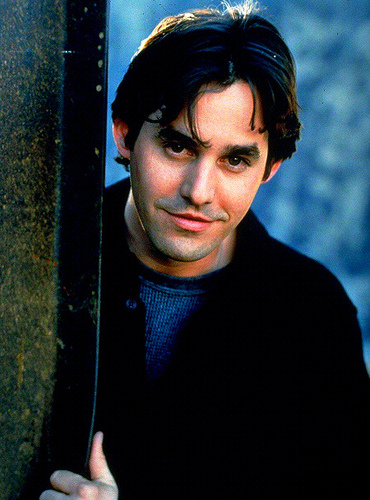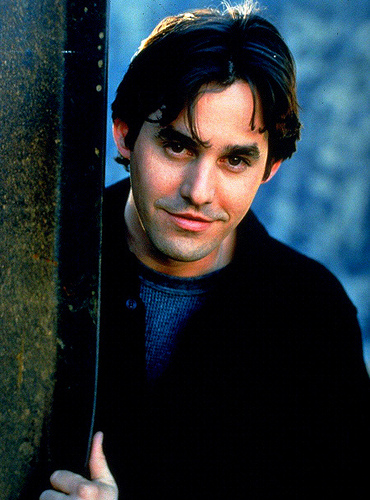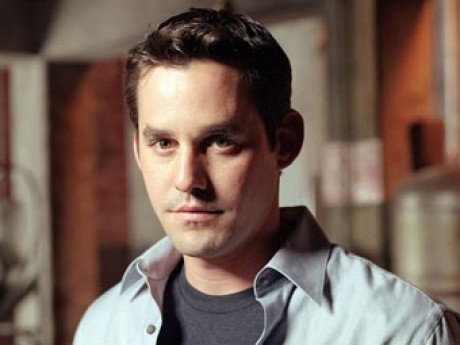 |
| Xander Harris (Nicholas Brendon), cavalry guy with a rock (not pictured: rock) |
Buffy the Vampire Slayer has a great cast of characters that includes many flawed, admirable, psychologically complex (white) women. Two of them (Buffy and Cordelia) are some of my most beloved television characters ever. Another (Willow) fascinates me and infuriates me in equal measure. The rest of the female cast resonate more with other people than they do with me, giving a variety of watchers (as in television watchers, not the Council of Watchers, hey-o!) a large selection of women to relate to and find inspiring.
Buffy the Vampire Slayer also has Xander Harris, a character who is, perhaps, not as inspiring for a feminist viewer of the show. After all, he’s a bit of a Nice Guy. He’s slut-shamed his romantic partners and female friends. He’s been a judgmental jerk about his friends’ lives. He’s my favorite character on the show.
*record scratch* Wait, what?
 |
| Seriously? This guy? |
Yes, it’s true. Despite Xander’s many flaws, despite the fact that he’s said and done a few things that have made me want to reach into the television screen and shake him a little, I still count him as my favorite of the many characters on Buffy that I love.
Some of the reasons I love Xander are obvious to anyone who knows me or has read my writing: he’s funny and a loyal friend, and I tend to be attracted to that particular character archetype (see Weasley, Ron and Gamgee, Samwise). I also love him for his bravery and the fact that he always fights the good fight despite not having any superpowers. Other reasons are less obvious, because I’m a feminist and Xander has, let’s say, issues with women – but if anything, my feminism has made me appreciate him as a character even more than when I first started watching the show.
When I look at Xander through a feminist lens, I find him fascinating because he’s a mass of contradictions. He’s a would-be “man’s man” – obsessed with being manly – whose only close friends are women. He’s both a perpetrator and victim of sexual assault and/or violation of consent. He’s both attracted to and intimidated by strong women. He jokes about objectifying women and viewing sex as some sort of game, but in more intimate moments, seems to value romance and real connection. He’s a willing participant in the patriarchy and also a victim of it.
The last point is the main one I’m going to address in this post. I hesitate to wring my hands and go “what about teh menz?!” but I think deconstructing traditional masculinity is an important part of feminism, and while Buffy has excellent commentary on the way gender roles have negatively affected women, it also shows us, through Xander, how these gender roles are no picnic for men, either.
 |
| Xander and a phallic symbol. He has a complicated relationship with these things. |
Xander is a boy who struggles with his relationship with masculinity, and the source of much of this struggle can be traced back to his childhood. In the first few seasons, we’re given brief glimpses into Xander’s home life, and even though we never see his parents onscreen, what we dosee isn’t pretty. His mother doesn’t recognize his voice when he calls her at home. During the holidays, he spends his nights on the lawn in a sleeping bag to avoid his family’s drunken Christmas fights. He watches movies with Anya, Buffy, and Riley in his family’s basement as his parents fight loudly above them. When Buffy expresses shock that a villain of the week turned out to be a cruel children’s baseball coach, Xander replies, “Well, you obviously haven’t played Kiddie League. I’m surprised it wasn’t one of the parents,” showing a disturbing familiarity with the way adults can be harmful to children.
The show leaves little hints about Xander’s upbringing throughout the first four seasons, but the first time we see one of his family members is in “Restless.” During Xander’s dream sequence, he constantly finds himself returning to his parents’ basement, and we’re left with the impression that his biggest fear is to be stuck aimless, drifting from job to job, and being a loser.
Then the basement door opens, and we see the shrouded, partially obscured vision of Xander’s father. A physically imposing man, he walks down the stairs and berates Xander for being ashamed of his family. And Xander, who has fought vampires, who stared down a vicious bully with a quiet smile on his face, who has saved the lives of each one of his friends at one point or another, can’t look his father in the eye. He’s at a loss for words, offering only a weak “You don’t understand” before hearing the rest of his father’s tirade: “The line ends here with us, and you’re not gonna change that. You don’t have the heart.”
And his father reaches into Xander’s chest and pulls out his heart.
 |
| Xander and his father (Michael Harney) |
Yes, the person who really ripped out Xander’s heart was the spirit of the First Slayer, but the point is clear: his father is the scariest, most threatening figure in Xander’s life. He is literally the source of Xander’s nightmares, and his speech speaks to Xander’s biggest fear: that he will never escape the cycle of abuse from his family, and that he might someday become just like his father.
Presented with an unhealthy example of abusive, aggressive male behavior throughout his life, Xander struggles with his masculinity as a teen and a young man. He doesn’t have a healthy relationship with his father, the only male authority figure he admires (Giles) mostly views him as an annoyance, and after Jesse dies in the second episode, he has no male friends.
Xander is essentially left to his own devices to construct his version of masculinity, and seems to have pieced lessons about “what it means to be a man” from his father, the media, and pornography. However, Xander’s ideas about how to be manly often run counter to Xander’s actual desires and needs, and he’s in constant conflict between what he, as a young man, is supposed to want, and what he actually wants.
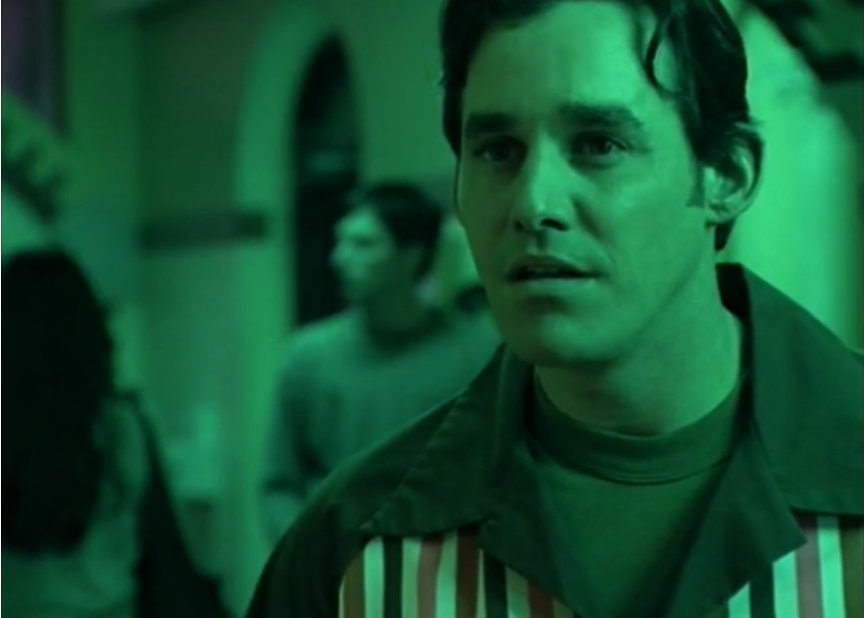 |
| Xander is confused. He gets that way a lot. |
Real men get into fights. One of Xander’s many admirable traits is his willingness to fight the good fight no matter what. He’ll pull Cordelia out of a raging fire. He’ll shove Willow to safety as he takes on a vampire without the aid of any weapons. This is a good quality of his, but sometimes he gets into physical altercations when he doesn’t have to and has a negative opinion of himself when he fails to be macho “enough.”
Case in point: the episode “Halloween.” Xander stands up for Buffy when Larry calls her “fast,” and then grabs him by the shirt with a vow to do something “manly.” Larry is quickly about to get the upper hand in the fight, but Buffy twists Larry’s arm behind his back and sends him limping away. Xander is furious – at Buffy, for humiliating him in front of their classmates. He’s convinced that everyone will make fun of him for being rescued by a girl, even though the person made to look most ridiculous in that situation is Larry. He’s terrified of being seen as weak and cowardly and would rather lose in a fight than be rescued by a girl.
And this is hardly the only incident where Xander shows insecurity over his lack of physical strength and fighting power. He hero-worships Riley for possessing the fighting skills he lacks, even though Xander has probably fought and killed more vampires and demons while fighting next to Buffy than Riley did during his time in the Initiative. He comes down hard on himself for not having superpowers and not being able to “contribute” to the group the way Giles, Buffy, and Willow can, even though he’s saved all of their lives on several different occasions. He doesn’t fit his own ideal image of a macho man.
 |
| Who says his Snoopy Dance isn’t manly? |
Real men want swooning, submissive ladies.The audience has been witness to some of Xander’s sexist fantasies regarding women. We’ve seen him fantasize about rescuing a trembling, victimized Buffy from a vampire and then leaping onstage for a guitar solo that makes her eyes flutter and her panties wet. We’ve seen him fantasize about two younger, submissive potential Slayers coming into his room to have a threesome with him while other potential Slayers have a Sapphic pillow fight in the background. We’ve seen him wax rhapsodic about the idea of a submissive sexbot, and when his girlfriend and friends look at him with disgust, he says, “No guys, huh? I miss Oz. He would’ve gotten it. He wouldn’t have said anything, but he would have gotten it.”
Xander is wrong, of course – Oz never took the bait when another man invited him to sexually objectify a girl. But he’s also wrong about himself. Xander may talk a good game about wanting a submissive woman to serve him, but his dating history points to an opposite trend of being attracted to assertive – sometimes even aggressive – women. His first girlfriend is Cordelia, the former queen bee of the high school, a girl who defeated a vampire simply by threatening him. His second girlfriend is Anya, a former vengeance demon who spent one thousand years eviscerating men, a woman who never shied away from expressing an opinion even if others found it rude. He’s attracted to both Buffy and Faith, Slayers with physical strength who also know how to fight with their words, but any attraction he had to Kendra died when she couldn’t look him in the eye while speaking to him.
 |
| Xander and Cordelia (Charisma Carpenter), his original acid-tongued sweetheart |
There’s a part of Xander that wants the stereotypical male fantasy of a girl who will serve at his whim, but the larger part of him seems to crave a woman who will speak her mind and banter with him. If he ever did find a girlfriend who only wanted to serve and please, he’d be bored within a few hours, though I’m not sure he has the self-awareness to realize that yet.
Real men always want sex. Xander can be gross when it comes to women. He makes sexually objectifying comments about his female friends. He thinks about sex all the time, as confirmed when Buffy gains the ability to read minds and gets wind of his inner monologue. He sees nothing wrong with making comments about women’s bodies in front of his female friends, and fantasizing about Willow and Tara’s sex life in front of Buffy and Dawn.
Yet there’s another side of Xander when it comes to sex, one that doesn’t come out as often: he values and craves intimacy. When he dreams about Joyce Summers in “Restless,” he confirms that he’s more interested in comfort than in conquest: “I’m a comfortador.” After he has sex with Faith, he doesn’t brag to his friends the way we’d expect him to, but tries to prevent Buffy from finding out and only spills the beans when he thinks the information might help – and he’s crushed when Faith dismisses their one-night stand as meaningless to her: “I thought we had a connection.”
It’s clear that intimacy is more important to Xander than merely getting his rocks off, but the side of him he chooses to show with his friends is the side that’s gross and reducing women to sex objects – even though his friends like the sweet side of Xander a lot more than the pig he often lets out.
Real men get into fights. Real men want submissive women. Real men want sex. These are the lessons that Xander internalizes, and where does that leave him? It leaves him feeling inadequate. It leaves him feeling unloved. It leaves him angry, and when he’s angry, he uses his words as weapons and cruelly lashes out at the people he loves the most – in short, repeating some of the behavior he learned from his father.
The worst part is that Xander often isn’t self-aware enough to see what he’s doing, even as he can recognize this detrimental behavior in other men. He criticizes his friend Riley for acting too macho and blowing up a crypt without waiting for backup. He’s disgusted with Spike for creating the Buffybot. He thinks Warren, Jonathan, and Andrew are creepy and gross. He’s right about all of these things, but if someone were to point out the similarities between his behavior and theirs, he’d be in deep denial to hear it – because as much as Xander wants to be like other men, he wants even more to not be like those men, those jerks who take advantage of women and try too hard to wow people with their macho behavior.
Xander has many wonderful qualities. He can be very brave, loyal, selfless, and loving, and the boy knows how to turn a phrase. He can also be insecure, angry, sexist, cruel, and judgmental. Close to the end of the series, he becomes more at peace with himself and lets go of much of his anger and judgment, but if we didn’t live in a culture that fetishizes and celebrates the most aggressive and disgustingly macho versions of masculine behavior, maybe he would have reached that point much earlier in his life.
I don’t think it’s a coincidence that Xander becomes more at peace with himself – and becomes a better friend – when he gets over the need to be our culture’s definition of a man and instead does what he does best: take on the more traditionally feminine role of comforter and emotional support for the people he loves.
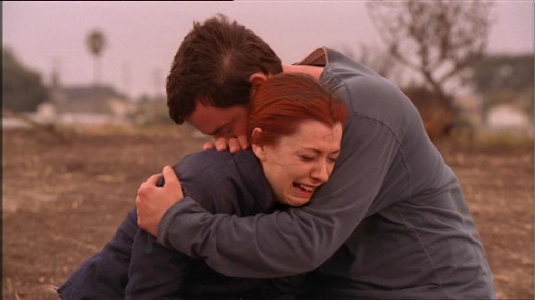 |
| Xander embraces his comfortador role, helps Willow (Alyson Hannigan), and saves the world with a hug. |
Lady T is an aspiring writer and comedian with two novels, a play, and a collection of comedy sketches in progress. She hopes to one day be published and finish one of her projects (not in that order). You can find more of her writing at The Funny Feminist, where she picks apart entertainment and reviews movies she hasn’t seen.
